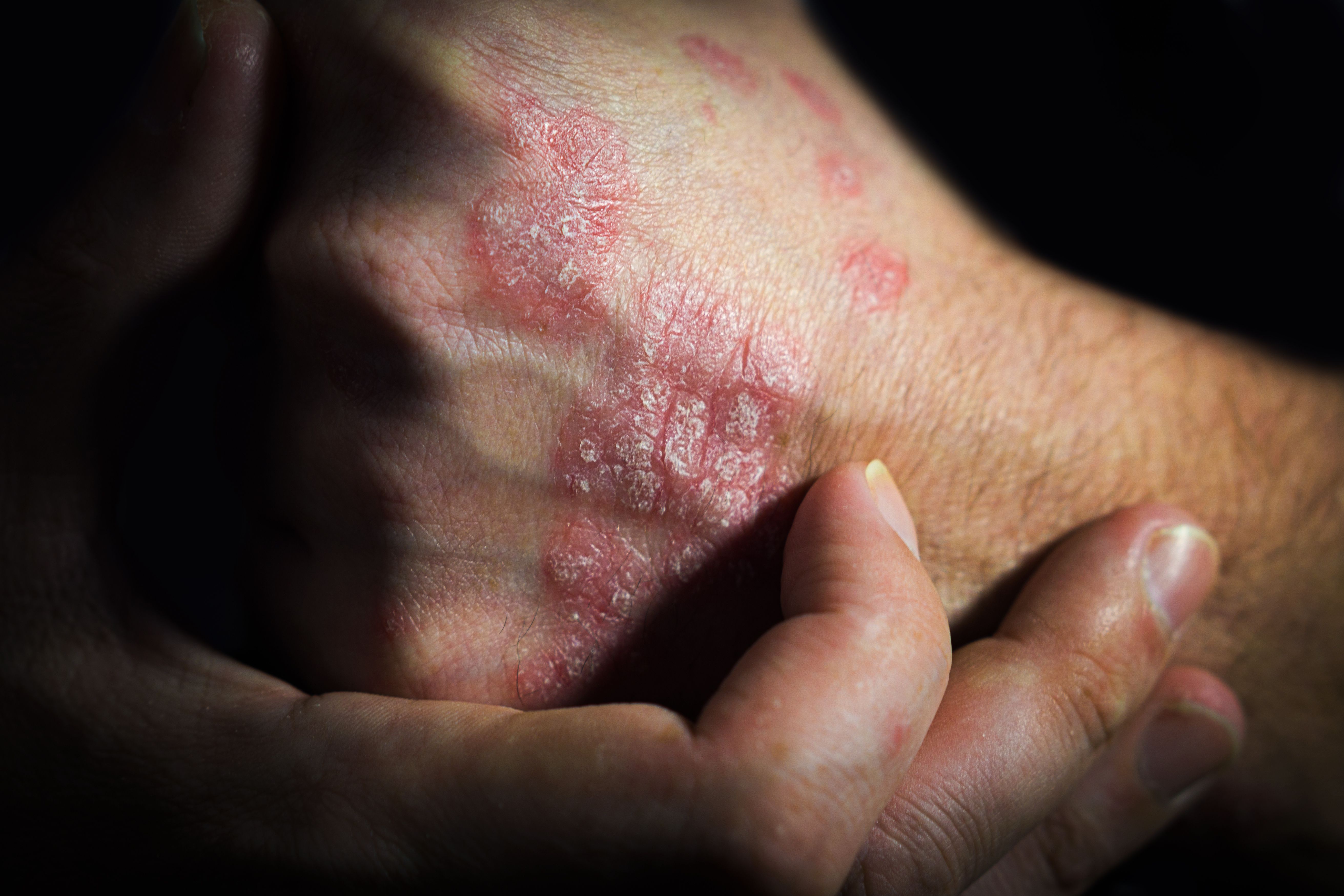- Case-Based Roundtable
- General Dermatology
- Eczema
- Chronic Hand Eczema
- Alopecia
- Aesthetics
- Vitiligo
- COVID-19
- Actinic Keratosis
- Precision Medicine and Biologics
- Rare Disease
- Wound Care
- Rosacea
- Psoriasis
- Psoriatic Arthritis
- Atopic Dermatitis
- Melasma
- NP and PA
- Skin Cancer
- Hidradenitis Suppurativa
- Drug Watch
- Pigmentary Disorders
- Acne
- Pediatric Dermatology
- Practice Management
- Prurigo Nodularis
- Buy-and-Bill
Video
How Personalized Medicine Has the Potential to Revolutionize Dermatology
Author(s):
Recent advances in technology have begun to allow the realization of personalized medicine in the practice of dermatology.
Personalized medicine (sometimes referred to as precision medicine), is defined as an approach to disease prevention or treatment based on each patient’s genetic makeup. It aims to reduce the cost of treatment by aiding in the selection of the right medication for the right patient, which heavily relies on biomarkers. Biomarkers are an integral part of personalized medicine and are defined as indicators of normal or pathological biological processes which can be obtained from tissue or blood. The American Academy of Dermatology (AAD) and National Psoriasis Foundation (NPF) joint official guidelines on the treatment of psoriasis with biologic agents reference the utility of biomarker use in efficient treatment1.
Nicholas Brownstone, MD, and colleagues, recently published one of the most up to date and comprehensive reviews of personalized medicine in the field of dermatology. The authors began with a discuss psoriasis and noted that the most common reason for discontinuing biologic treatments is lack of effectiveness. Surprisingly, a prospective, observational cohort study found that nearly half of the patients in a study discontinued their biologic therapy due to lack of efficacy over a 3 year period2. Moreover, there are data to show that drug efficacy in real world conditions is noticeably lower than purported clinical trial data3. Therefore, personalized medicine can help to mitigate this issue by initially selecting a more appropriate medication for a particular patient. “Personalized medicine is a powerful tool that has the potential to positively influence every stakeholder involved in patient care. It has the ability to minimize patient adverse events, help clinicians choose the most effective therapy and reduce insurance costs by avoiding secondary and tertiary drug failures” said Brownstone.
A few studies in psoriasis patients have identified genetic markers which can aid in predicting clinical response to biologic agents. Polymorphisms in genes encoding TNF, TNF receptor superfamily 1B (TNFR1B), and TNF induced protein 3 (TNFAIP3) have been correlated with response to anti‐TNF therapy in patients with psoriasis4. Another study highlighted that single‐nucleotide polymorphism (SNP) rs4819554 in the promoter region of IL‐17RA gene significantly affected the response to anti‐TNF drugs. Similarly, patients had an improved response to etanercept who were heterozygous for an SNP in CD84 (rs6427528).
A recent review paper found the following gene polymorphisms (TNFR1b, TNFAIP3, TNF, HLA‐C, IL‐17R, ERAP1) influenced the response to treatment with biologics agents5. On this topic, Brownstone remarked, “given that there are now over 10 biologics that are FDA approved for the treatment of psoriasis, with more agents in the pipeline, precision medicine tests could help clinicians choose the most effective therapy class for that particular patient without resorting to trial and error methods which most clinicians usually employ currently”
In atopic dermatitis, serum thymus and activation regulated chemokine (TARC) is considered to be the superior serum biomarker for assessing disease severity. In a systemic review on serum biomarkers for disease severity in AD, TARC levels exhibited the best correlation with disease severity6. Given the heterogeneity of this disease, more studies are required in large cohorts of patients to further define potential AD biomarkers for diagnostic and treatment purposes. More clinicians are beginning to embrace personalized medicine in the treatment of AD given that the International Eczema Council recently published a review on biomarkers in AD7.
Furthermore, personalized medicine can be used in the treatment of skin cancer as current melanoma therapy utilizes biomarkers for more effective diagnosis and treatment. Lactate dehydrogenase (LDH) has proven to be an important biomarker in prognosis8. Patients with BRAF V600 mutation have a high probability of response to BRAF/MEK inhibition with low rates of primary resistance9. Current studies in melanoma therapy are investigating eosinophil, lymphocyte and LDH as biomarkers for response to immunotherapy agents such as pembrolizumab.
There have been a few exciting updates in personalized medicine as the technology is being used to study other less common conditions in dermatology. Castillo et. al. published a review paper on using the massive amount of “multi-omics” data to help predict extracutaneous disease dermatomyositis (DM), differentiate between idiopathic inflammatory myopathies (IIM) subgroups and other (DM) mimics and better understand the true pathogenesis of DM10. Labrode et. al. are using a personalized medicine approach to treating psoriatic arthritis (PsA) and studied gene regulation signatures in peripheral blood and other tissues with the goal of more effectively diagnosing PsA11. Pemphigus vulgaris is being studied with the hopes of developing a personalized treatment approach with cheremic autoantigen receptor T cell (CAAR) technology12. While not ready for clinical use yet, several new promising prognostic melanoma biomarkers are emerging (exosomal MIA, serum S100B, AMLo/mRNA signatures)13. Brownstone concluded with the following thought, “personalized medicine in dermatology has the potential to be a powerful tool in our treatment armamentarium, but more studies are needed to determine the safe and appropriate use, as well as ethical and medicolegal implications, of this novel technology”.
References:
1. Joint AAD-NPF guidelines of care for the management and treatment of psoriasis with biologics - Journal of the American Academy of Dermatology. Accessed July 2, 2022. https://www.jaad.org/article/S0190-9622(18)33001-9/fulltext
2. Warren RB, Smith CH, Yiu ZZN, et al. Differential Drug Survival of Biologic Therapies for the Treatment of Psoriasis: A Prospective Observational Cohort Study from the British Association of Dermatologists Biologic Interventions Register (BADBIR). J Invest Dermatol. 2015;135(11):2632-2640. doi:10.1038/jid.2015.208
3. Enos CW, O’Connell KA, Harrison RW, McLean RR, Dube B, Voorhees ASV. Psoriasis Severity, Comorbidities, and Treatment Response Differ among Geographic Regions in the United States. JID Innovations. 2021;1(2). doi:10.1016/j.xjidi.2021.100025
4. Gene polymorphisms that can predict response to anti-TNF therapy in patients with psoriasis and related autoimmune diseases | The Pharmacogenomics Journal. Accessed July 3, 2022. https://www.nature.com/articles/tpj201253
5. Osmola-Mańkowska A, Teresiak-Mikołajczak E, Skrzypczak-Zielińska M, Adamski Z. Genetic polymorphism in psoriasis and its meaning for the treatment efficacy in the future. Adv Dermatol Allergol. 2018;35(4):331-337. doi:10.5114/ada.2018.77661
6. Thijs J, Krastev T, Weidinger S, et al. Biomarkers for atopic dermatitis: a systematic review and meta-analysis. Current Opinion in Allergy and Clinical Immunology. 2015;15(5):453-460. doi:10.1097/ACI.0000000000000198
7. Renert-Yuval Y, Thyssen JP, Bissonnette R, et al. Biomarkers in atopic dermatitis—a review on behalf of the International Eczema Council. Journal of Allergy and Clinical Immunology. 2021;147(4):1174-1190.e1. doi:10.1016/j.jaci.2021.01.013
8. Franzke A, Probst-Kepper M, Buer J, et al. Elevated pretreatment serum levels of soluble vascular cell adhesion molecule 1 and lactate dehydrogenase as predictors of survival in cutaneous metastatic malignant melanoma. Br J Cancer. 1998;78(1):40-45. doi:10.1038/bjc.1998.439
9. Hauschild A, Grob JJ, Demidov LV, et al. Dabrafenib in BRAF-mutated metastatic melanoma: a multicentre, open-label, phase 3 randomised controlled trial. The Lancet. 2012;380(9839):358-365. doi:10.1016/S0140-6736(12)60868-X
10. Castillo RL, Femia AN. Polishing the crystal ball: mining multi-omics data in dermatomyositis. Ann Transl Med. 2021;9(5):435. doi:10.21037/atm-20-5319
11. Laborde CM, Larzabal L, González-Cantero Á, Castro-Santos P, Díaz-Peña R. Advances of Genomic Medicine in Psoriatic Arthritis. J Pers Med. 2022;12(1):35. doi:10.3390/jpm12010035
12. Bieber K, Kridin K, Emtenani S, Boch K, Schmidt E, Ludwig RJ. Milestones in Personalized Medicine in Pemphigus and Pemphigoid. Front Immunol. 2020;11:591971. doi:10.3389/fimmu.2020.591971
13. Ding L, Gosh A, Lee DJ, et al. Prognostic biomarkers of cutaneous melanoma. Photodermatol Photoimmunol Photomed. Published online January 3, 2022. doi:10.1111/phpp.12770






